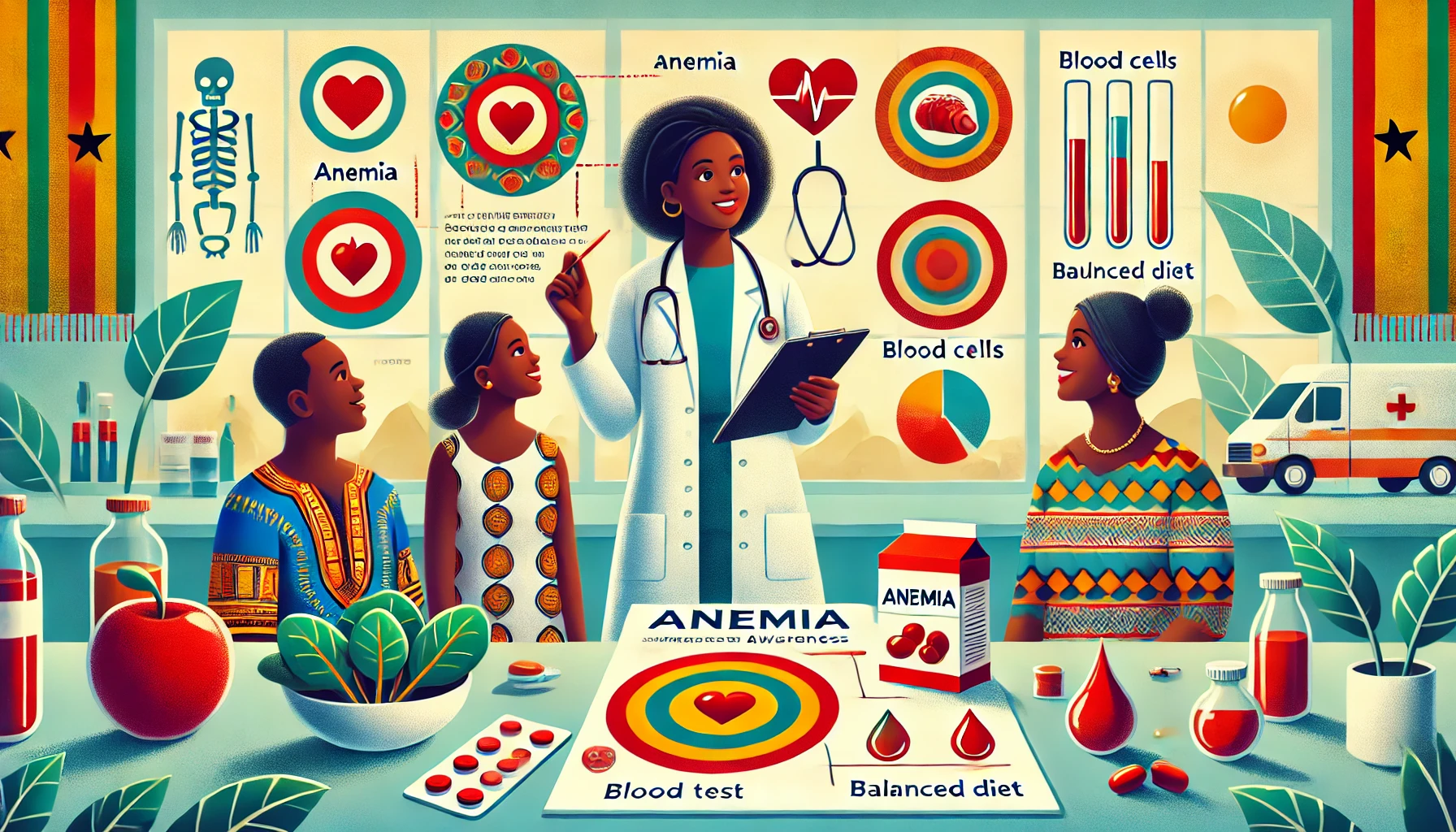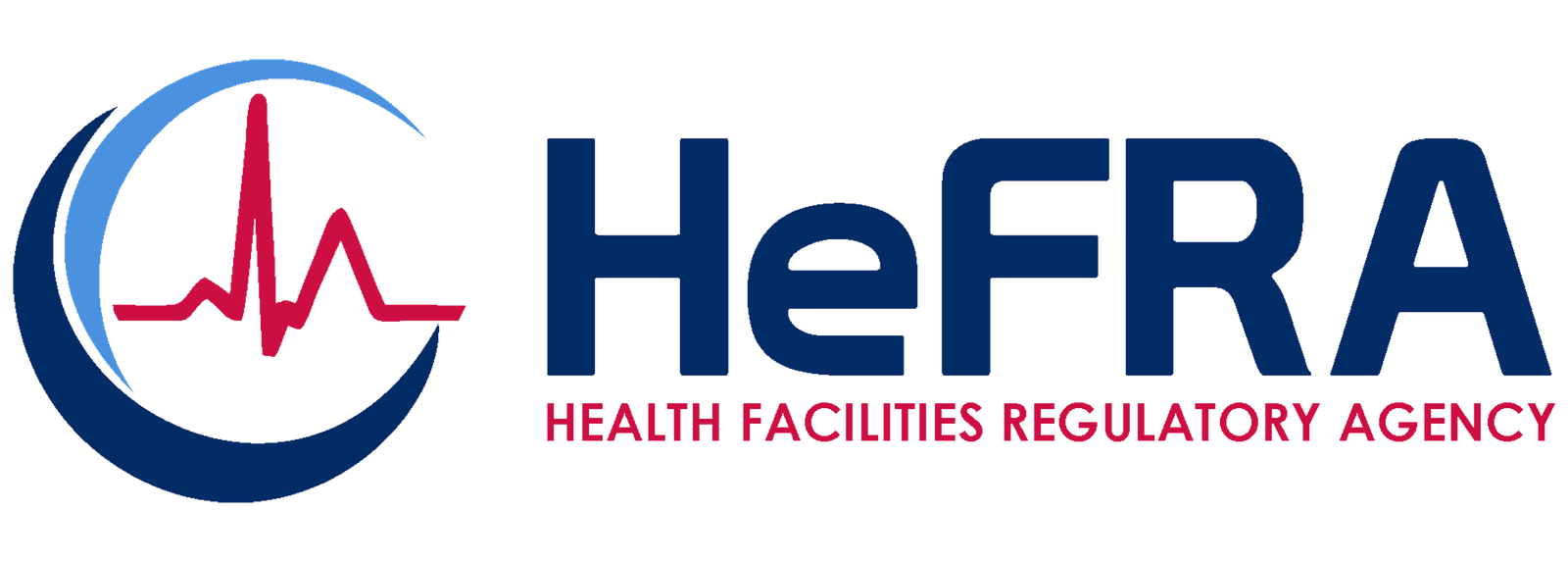
Silent Fatigue, Loud Solutions: Ending Anaemia’s Reign on Ghanaians 🩸🆘
Anaemia (also spelled “anemia”) is a common health condition worldwide, including here in Ghana. Many people refer to it as “blood shortage,” and there are many myths about it in our communities. This article will explain what anaemia really is, why it happens, how it is treated, and how you can prevent it. We will also discuss some of the common questions that Ghanaians ask about anaemia and address the myths and misconceptions surrounding it.
1. WHAT IS ANAEMIA?
Anaemia means there is a lack of healthy red blood cells or low haemoglobin levels in the blood. Red blood cells and their haemoglobin help carry oxygen to every part of the body. When they are too few or not working properly, less oxygen reaches your tissues and organs, causing tiredness and other symptoms.
Common questions people ask:
- “What does anaemia mean?” It means you have fewer red blood cells or lower haemoglobin than normal, leading to less oxygen in your body.
- “When does anaemia occur?” Anaemia occurs when the body does not produce enough red blood cells, when it destroys them too quickly, or when you lose a lot of blood (for example, through heavy menstruation or injuries).
2. CAUSES OF ANAEMIA IN GHANA
Several factors can cause anaemia. The most common in Ghana include:
2.1 Poor Nutrition (Nutritional Anaemia)
- Not getting enough iron, folic acid, or vitamin B12 in your diet can lead to anaemia.
- Lack of balanced meals (e.g., skipping vegetables, beans, or meat/fish) can cause nutritional gaps.
2.2 Chronic Diseases or Infections
- Malaria: A frequent cause of anaemia in Ghana, as the malaria parasite destroys red blood cells.
- Worm Infestation (e.g., hookworms): These parasites feed on blood, leading to blood loss.
- Chronic Conditions: HIV/AIDS, kidney disease (CKD), and rheumatoid arthritis, among others, can contribute to anaemia (anaemia of chronic disease).
2.3 Blood Loss
- Heavy menstrual bleeding can lead to anaemia, especially if not properly managed.
- Accidents, childbirth complications, or bleeding from ulcers can also contribute.
2.4 Genetic Causes
- Sickle Cell Anaemia: This is an inherited condition very common in parts of Ghana.
- Thalassemia or other haemolytic anaemias (less common but still present).
2.5 Other Causes
- Pernicious anaemia (due to vitamin B12 deficiency).
- Certain medications or treatments (like chemotherapy).
Common questions people ask about causes:
- “What causes anaemia in pregnancy?” During pregnancy, the body needs more blood and nutrients. Poor nutrition, malaria, and heavy vomiting can all contribute to anaemia in pregnant women.
- “Can anaemia be caused by deficiency of vitamins?” Yes. Deficiencies of iron, vitamin B12, and folic acid are leading causes of nutritional anaemia.
Images are only illustrative; may not pass an academic critique
3. SIGNS AND SYMPTOMS OF ANAEMIA
Anaemia can show up in many ways. Some people have mild symptoms, while others have more severe signs. Common symptoms include:
3.1 Tiredness and Weakness
- Feeling very tired even after minimal activity.
- Lack of energy to carry out daily tasks.
3.2 Shortness of Breath / Palpitations
- Feeling breathless after a little exercise or climbing stairs.
- Heart beating very fast (palpitations), because the heart tries to pump more blood to compensate for low oxygen.
3.3 Dizziness or Light-Headedness
- Feeling faint, especially when getting up from a sitting or lying position.
3.4 Headaches
- Reduced oxygen in the brain can sometimes cause headaches.
3.5 Pale Skin and Pale Eyelids
- Check the inner eyelids, palms, or nails; they may look pale or less pink than normal.
3.6 Other Possible Symptoms
- Chest pain (if anaemia is severe).
- Nausea or loss of appetite.
- Itchy skin (less common, but can happen).
- Insomnia or difficulty sleeping.
- High or low blood pressure (though it’s less common, severe anaemia can affect blood pressure).
- Irregular menstruation (periods can become heavier, lighter, or stop in severe cases).
- Seizures (very rare in extreme cases).
Common questions people ask about symptoms:
- “Can anaemia cause headaches, chest pain, or dizziness?” Yes, these are common symptoms.
- “Can anaemia kill?” Severe, untreated anaemia can lead to complications like heart failure and can be life-threatening.
4. TREATMENT OPTIONS
Treating anaemia depends on the cause. Here are some general approaches:
4.1 Improving Nutrition
- Eating iron-rich foods such as green leafy vegetables (kontomire), beans, lean meats, eggs, and fish.
- Increasing foods with vitamin C (oranges, pineapples, tomatoes) helps the body absorb iron.
- Taking supplements of iron, folic acid, or vitamin B12 when prescribed by a health professional.
4.2 Treating Underlying Infections or Diseases
- If malaria is causing anaemia, taking anti-malarial medications is crucial.
- Deworming to reduce worm infestation.
- Managing chronic diseases like HIV/AIDS or kidney disease properly under medical supervision.
4.3 Blood Tonic and Other Supplements
- “Blood tonics” are popular in Ghana and often contain iron, vitamins, and other nutrients.
- They can help if you truly have iron deficiency, but they are not a magic cure for every type of anaemia.
- Always check labels or consult a pharmacist or doctor to ensure you get the right supplement for your specific condition.
4.4 Blood Transfusion
- In severe cases, especially during life-threatening anaemia, a blood transfusion might be necessary.
4.5 Medications and Injections
- For conditions like pernicious anaemia, vitamin B12 injections may be prescribed.
- For sickle cell crisis, pain management, folic acid supplementation, and hydration are key.
Images are only illustrative; may not pass an academic critique
Common questions about treatment:
- “Can anaemia be cured?” Many types of anaemia (especially nutritional ones) can be treated and even cured if the cause is resolved. Genetic types (e.g., sickle cell anaemia) cannot be completely cured but can be managed effectively.
- “How do I treat anaemia without going to the hospital?” While good nutrition helps, it is safest to get a proper diagnosis first. Self-treatment and relying on unverified herbal remedies can be dangerous.
5. COMPLICATIONS OF UNTREATED ANAEMIA
- Heart Failure: The heart works harder to pump enough oxygen, which can lead to enlargement and eventual failure.
- Growth and Development Issues: In children, it can stunt growth and affect learning.
- Complications in Pregnancy: Low birth weight, premature birth, and maternal death.
- Increased Susceptibility to Infections: Low blood levels can weaken the immune system.
6. ADDRESSING MYTHS AND MISCONCEPTIONS
- Myth: Anaemia is always due to spiritual causes. Fact: Anaemia is a medical condition that can be diagnosed with blood tests and treated with proper medication and dietary changes.
- Myth: Any “blood tonic” can cure anaemia. Fact: Blood tonics can help if they provide the nutrients you specifically lack (like iron or vitamins). However, you need the right treatment, depending on the type of anaemia.
- Myth: Anaemia only happens to women. Fact: While women are more prone to iron-deficiency anaemia due to menstruation and pregnancy, men can also have anaemia from poor diet, infections, or chronic illnesses.
- Myth: Only old people get anaemia. Fact: People of all ages can get anaemia, including children and teenagers.
- Myth: If you’re anaemic, you should just rest more. Fact: Rest alone does not fix anaemia. Proper diagnosis, treatment, and balanced nutrition are essential.
- Myth: Herbal concoctions alone can fix severe anaemia. Fact: Some herbal treatments may have mild benefits, but many are unproven. Severe anaemia may require medical interventions such as transfusions or targeted medications.
Images are only illustrative; may not pass an academic critique
7. PREVENTION TIPS
7.1 Eat a Balanced Diet
- Make sure each meal contains vegetables, protein (fish, eggs, beans, lean meat), fruits, and whole grains.
7.2 Prevent and Treat Infections Early
- Sleep under an insecticide-treated bed net to avoid malaria.
- Deworm regularly as recommended by your healthcare provider.
7.3 Regular Check-Ups
- Routine blood tests can catch anaemia early.
- Pregnant women should attend antenatal care to monitor haemoglobin levels.
7.4 Address Heavy Menstruation
- If your period is unusually heavy or prolonged, talk to a health professional. They may prescribe iron supplements or investigate underlying causes.
7.5 Avoid Self-Medication
- Always seek professional advice before taking any medication or herbal product.
Images are only illustrative; may not pass an academic critique
8. WHEN TO SEE A DOCTOR
Visit a healthcare professional if you notice:
- Constant tiredness or weakness that does not improve with rest.
- Frequent dizziness, fainting spells, or headaches.
- Unusual changes in your skin or eyes (e.g., becoming pale or yellowish).
- Heavy or prolonged menstrual bleeding.
- Chest pain, palpitations, or shortness of breath.
- No improvement after taking recommended supplements.
Early diagnosis and proper treatment are key to avoiding severe complications.
CONCLUSION
Anaemia is a significant health issue in Ghana, but it is not a mysterious or purely spiritual condition. It has real, identifiable causes—ranging from poor nutrition to infections like malaria—and it can be treated and prevented with the right knowledge and care.
If you suspect anaemia, do not rely solely on unproven remedies or unqualified traditional healers. While some herbal concoctions and “blood tonics” may provide some benefits, the best step is to visit a qualified health professional for accurate diagnosis and treatment. By eating a balanced diet, addressing infections early, and knowing the signs and symptoms, you can protect yourself and your loved ones from the dangers of anaemia.
Remember: health is wealth, and with the right information and action, anaemia can be prevented or managed successfully in Ghana.
- Sickle Cell Strong: Empowering Ghanaians with Knowledge and Practical Solutions 🩸🔴🤕
- Ghana’s Blood Group Bible | Busting Myths, Saving Lives – From O+ to AB- 🩸
- From Waakye to Wellness 🍽️💪: Fixing Ghana’s Malnutrition Puzzle
- Building Immunity: Your Path To a Disease-Free Future 💪
- Kidney Health 101 for Ghanaians 🌱🍏🥕🥬

We Love to Educate for Free
But please do not self-medicate as wrong doses of even correct medications can cause serious complications like kidney failure and even death. You can talk to a LICENSED health professional (including medical doctors, specialists, physician assistants, clinical psychologists, nutritionists/dieticians, medical herbalists, etc) by downloading the Deluxe Hospital app here:










